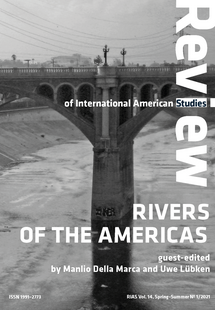“Strangers Still More Strange”: The Meaning of Rivers Bedeviled
“Strangers Still More Strange”: The Meaning of Rivers Bedeviled
Author(s): T. S. McMillinSubject(s): 19th Century, Theory of Literature, American Literature
Published by: Wydawnictwo Uniwersytetu Śląskiego
Keywords: Mississippi River; steamboat; Herman Melville; literature and interpretation;
Summary/Abstract: Steamboats transformed rivers in the nineteenth-century United States, providing what many people considered a kind of mastery over nature. In literature from the period, while most writers marveled at or exulted in that perceived mastery, some questioned the origins of the reputed conquest. Did it result from human ingenuity? divine inspiration? a deal with the devil? Amid all the fog, smoke, and other vapors associated with the steamboat, vivid stories, compelling dramas, and comic searches for meaning took shape, and no literary work captured the tension informing, uncertainty surrounding, and ramifications emerging from this instance of technological innovation as powerfully as The Confidence-Man: His Masquerade (1857). Herman Melville’s last novel, The Confidence-Man explores the author’s notion that “Books of fiction” can perhaps give readers more truth, “more reality, than real life can show.” Literature, for Melville, was an opportunity to reconsider the nature of things and our means of understanding that nature. In The Confidence-Man, he presented readers with a different view of the Mississippi River and the curious vessels working its waters. The novel imagined The Devil himself to be on board the steamboat, imperiling the soul of America.
Journal: Review of International American Studies
- Issue Year: 14/2021
- Issue No: 1
- Page Range: 49-76
- Page Count: 28
- Language: English

